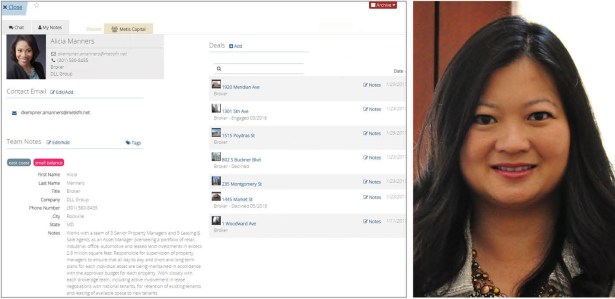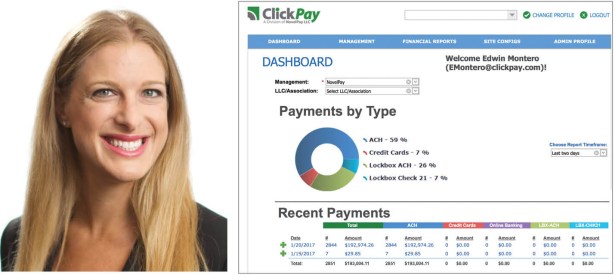In the Testosterone-Heavy Worlds of CRE and Tech, Try Being a Woman
By Lauren Elkies Schram February 1, 2017 10:30 am
reprints
Two years ago when Francesca Loftus co-founded hOM—along with her husband Corey Loftus, the firm’s chief service officer, and Ryan Freed, the chief revenue officer—she was advised to tell employees how to do things, rather than ask them. And she shouldn’t laugh or smile too much because doing so was “not powerful enough,” she was told.
Of course, the people advising the then-23-year-old chief executive officer of the subscription-based wellness service for buildings, were all men.
“Those things work for a 40-year-old male,” Loftus said. “It looks arrogant as a woman and as a young person I look like a bitch.”
So Loftus didn’t heed their advice. Instead, she has embraced her gender (and her personality).
“I do very much use it. I own it,” Loftus said. “I kind of love being the minority in the space. I love being a young female. They remember me.”
Being unable to find female mentors isn’t surprising considering Loftus’ startup straddles two industries—commercial real estate and technology—that have been traditionally dominated by men.
Loftus is one of more than half a dozen female CRE tech leaders with whom Commercial Observer spoke that has risen to the top despite the fact that the numbers are against them.
Gender imbalance is prevalent in the tech business as a whole, and the situation appears to be getting worse. A 2015 study by the American Association of University Women shows that the gender gap in technology is widening among women, with women representing only 12 percent of engineers, and the number of women in computing dropping to 26 percent from 35 percent in 1990.
While CRE tech has been around for decades (think Trepp and LoopNet), there has been a new wave of advances in the last four or five years. Still, women executives in the space are few and far between. And the story isn’t any better for women in CRE tech than it is for women in tech, generally.
Only 19 of Commercial Real Estate Women [CREW] Network’s 10,000 members in the U.S. and Canada listed technology as their specialty, with only three of them from CREW New York. And, of the more than 30 property-related tech companies in which MetaProp NYC—a property-related tech investment fund, startup accelerator and advisory business—has invested in the last 18 months, only three have had female leaders. One of those is hOM.
Part of what makes it difficult for women navigating the world of CRE tech is the subtle ways that women are ignored.
Seated across the table negotiating deals, Clelia Peters, a co-founder and adviser to MetaProp NYC as well as the president of residential brokerage Warburg Realty, has found on occasion that the man across from her “is looking past me, even if I’m the most senior person” in the room. She added that it doesn’t happen that often, but maybe once a quarter she’ll “end up in a meeting where I say something and they respond to the man next to me.”
While she said that most men these days, particularly in New York City, are not doing it purposefully, she has dealt with sexism head on.
“I have had incidents when I have called that out and that can be powerful,” Peters, 38, said. “I have actually said to people—I would only do this one-on-one—‘I don’t know if you have done this intentionally but I wanted to tell you that I had a feeling you were not talking to me in the meeting. Is that correct?’ If they didn’t know, I would say…‘Maybe it’s just useful for you to know.’ ”
Camille Renshaw, the 45-year-old New York City-based head of sales on the commercial real estate side at Ten-X, an online real estate transaction marketplace, said, “Most sexism in the CRE tech workplace, in my experience, is peripheral.” So, “How do you handle promotions regarding an employee who you know is pregnant and will be out during a company growth phase? How do you assign client accounts who might prefer male salesmen? How do you create a gender-balanced team when all the applicants are male?”
The solution? “Great judgment and new strategies are required for these decisions,” Renshaw said.
Joy Hou, 41, is the co-founder and chief executive officer of MREN, a collaborative networking platform for commercial real estate professionals to manage and share deals, files and information throughout the life cycle of investments.

“I grew up on Wall Street, so I’ve always been the minority,” Hou said. “At Barclays, they thought I was a support rather than the decision maker. The good thing is I always try to turn these differences into a positive.”
Since soft launching in the middle of 2015, Hou has been mindful of her behavior as the leader of a team of eight male tech workers, something a man in her position likely wouldn’t be.
She said she has had to gain the team’s trust and relearn how to work with different types of people. And, she added, the male members of her team “had to learn that working with women, you tend to be a little more conservative, you tend to be a little more caring. Some guys have never worked for female superiors.”
Emily Kramer, the 34-year-old vice president of business development at ClickPay, an all-in-one real estate receivables platform, came into real estate tech 18 months ago by way of financial services. Internally, Kramer has felt supported as a worker among workers. “My experience outside of the company, in the industry, has been checkered in terms of being a woman,” she noted.

As one of a handful of women at trade shows and conferences, which are key to developing new business, Kramer is hyper-aware of her gender. While some women might be intimidated by that situation, Kramer doesn’t let it keep her down.
“You have to have enough confidence to embrace that you’re in the minority and to continue to prove value and to become an accepted part of their group,” she said.
And that means working harder than the next guy.
“I 100 percent need to outwork men to get the same opportunities for business development,” Kramer said. “How does that change your presentation knowing your audience is a room of men who may not have immediate respect for you? The answer is always ‘over-deliver.’ Always be the subject matter expert, and they start to accept you and you become one of them.”
Poonam Mathis, the CEO and founder of StealthForce, an online job platform providing project-based, real estate workers on-demand, similarly said women have to work extra-hard and then have to prove their intelligence.

“It’s like gravity,” said Mathis, 39, who started her business about a year ago after over a decade in real estate. “Gravity [or intelligence] is not implied when you’re a woman. It has to be stated.”
When Maggie Burns was running the strategic accounts group and helping grow portfolio-wide deals at CRE leasing and asset management platform VTS she would on occasion encounter sexism when dealing with C-level real estate pros.
“I would almost be regarded as the traveling secretary,” Burns, 34, said. Though she was in a leadership position, she recalls one of the men across the table from her during a pitch asking her to “ ‘write this down.’ ” Or, potential clients would say to her male colleagues about her, “ ‘Have your girl send me this or that.’ ”
She and her VTS colleagues would slough off the situation as she felt they saw her as a peer.
“They [didn’t] see me like that. They [didn’t] bring me to the meeting because I’m arm candy,” Burns said.

Not long after leaving VTS for Breather, a website that leases, designs and operates its own high-end, private meeting spaces, Burns was at the Real Estate Board of New York’s annual gala when a man told her she wouldn’t be in her new post long “ ‘because I will get married and have kids.’ ”
That was two and a half years ago and Burns is still the vice president of real estate—overseeing a team of nine people and 315 leases—and a member of the executive team at Breather.
One veteran says the dearth of women in CRE tech relates to learning opportunities and nurturing as children.
“I think part of the problem with not having enough women in technology goes back to women as students from grade school and up, not being encouraged to be in STEM [or science, technology, engineering and mathematics] courses,” said Annemarie DiCola, the CEO of data provider Trepp since 1995. “Some of the problems with the presence of women, more or less, probably stems to some extent back to the way they were raised and the way and what they were taught.”
Another reason for the low head count among women leaders in CRE tech relates to risk aversion, Peters said.
“Women have a slight bias to doing what they know and what they are good at,” she said.
Renshaw, the head of sales at Ten-X, has been in CRE for more than 20 years. She was a senior director at Stan Johnson Company, where she founded the net-lease space company’s New York office. Prior to that, she was the director of investment sales at Colliers International, where she was one of the company’s top 40 worldwide producers. She recalls at one of those two companies—she declined to say which—that on her first day on the job she was asked whose wife she was.

While it’s a man’s world out there in CRE tech, the women in the business are banding together with official groups like CREW Network and unofficial ones like a monthly gathering for female mid-level leaders in the field that Hou started about a year ago.
Thankfully, Renshaw said, “Most of the women who are in my position are pretty passionate about getting women into the industry. There are other businesses where women are cut throat and they don’t help each other.”
As an example Renshaw pointed to an interaction with Trepp’s DiCola.
Renshaw confided in DiCola during the job application process that she was being considered for a position at Ten-X, and when the former landed the position last summer, the pair met for a drink at the Harvard Club of New York. As they approached each other in the club, Renshaw said DiCola ran over to her and gave her a big hug.
“There is this wonderful allegiance among women that are here in commercial real estate and tech,” Renshaw said. “The power of women helping others is unparalleled.”



